Introduction:
Unlock your skin’s radiance and vitality by incorporating the best nutrients for skin health into your daily routine. Nutrients are vitally important substances that the body requires for growth, development, and overall maintenance of health.
Nutrients play an important role in maintaining skin health by influencing various physiological processes that contribute to its overall well-being. Essential vitamins such as A, C, E, Omega-3 fatty acids, Zinc, etc. are considered the best nutrients for skin health, They act as powerful antioxidants, shielding the skin from free radicals that can lead to premature aging and damage.
These include vitamins, minerals, proteins, carbohydrates, and fats. Each nutrient plays a specific role in supporting various bodily functions, such as energy production, immune system regulation, and cellular repair.
Vitamins and minerals act as cofactors in enzymatic reactions, contributing to processes like metabolism and tissue repair. Proteins are crucial for building and repairing tissues, while carbohydrates and fats serve as primary sources of energy.
These nutrients are obtained through the foods we consume. A balanced and diverse diet provides the best nutrients for skin health. It is a key to ensuring an adequate intake of essential nutrients. Fruits and vegetables are rich sources of vitamins and minerals, providing a spectrum of antioxidants and micronutrients.
Lean proteins from sources like poultry, fish, beans, and nuts contribute to muscle development and repair. Carbohydrates from whole grains, fruits, and vegetables supply energy for daily activities.
Healthy fats, found in avocados, nuts, and olive oil, are essential for cell structure and function. By embracing a varied and nutritious diet, individuals can ensure that they meet their body’s nutrient requirements for optimal health and well-being.
Best Nutrients For Skin Health: Eat and Glow
Maintaining healthy skin involves a combination of good skincare practices and proper nutrition. Here is a detailed discussion of the 15 best nutrients for skin health and how can we obtain them:
1. Vitamin A:
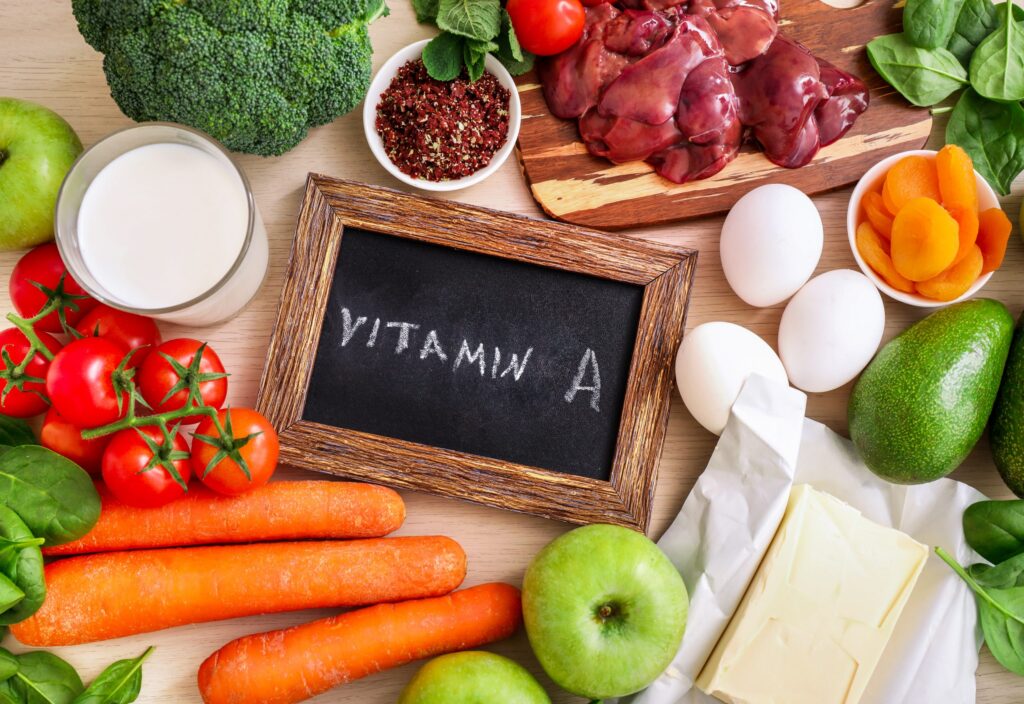
Vitamin A is a crucial nutrient for skin health, playing a fundamental role in promoting cell turnover, maintaining a healthy skin structure, and supporting overall skin function. As a potent antioxidant, vitamin A helps protect the skin from oxidative stress and free radical damage, contributing to a youthful and radiant complexion.
It is particularly known for its ability to regulate sebum production, preventing clogged pores and acne breakouts. Rich dietary sources of vitamin A include orange and yellow vegetables like sweet potatoes and carrots, dark leafy greens such as spinach and kale, as well as liver and fish.
Additionally, some plant-based foods contain provitamin A carotenoids, such as beta-carotene, which the body can convert into active vitamin A. Ensuring an adequate intake of vitamin A through a balanced diet is essential for maintaining optimal skin health.
2. Vitamin C:

Vitamin C is a key nutrient for skin health, celebrated for its powerful antioxidant properties and its pivotal role in collagen synthesis. As an antioxidant, vitamin C helps protect the skin from environmental damage and free radicals, which can contribute to premature aging.
Furthermore, it promotes the production of collagen, a protein crucial for maintaining skin elasticity and firmness. Vitamin C also aids in the repair of damaged skin cells and supports a more even skin tone by inhibiting melanin production. Excellent dietary sources of vitamin C include citrus fruits like oranges and grapefruits, strawberries, kiwi, bell peppers, and dark leafy greens such as spinach and kale.
Regularly incorporating these vitamin C-rich foods into your diet contributes to healthier, more resilient skin, and topical application of vitamin C serums can also provide targeted benefits for addressing specific skin concerns.
3. Vitamin D

Vitamin D is essential for skin health, playing a crucial role in various bodily functions, including supporting the immune system and promoting overall skin well-being. One of its primary roles is aiding in the absorption of calcium, which is vital for maintaining skin structure and integrity.
Exposure to sunlight is a natural way for the body to produce vitamin D, as ultraviolet B (UVB) rays interact with the skin to trigger its synthesis. Dietary sources of vitamin D include fatty fish like salmon and mackerel, fortified dairy products, and egg yolks.
Ensuring an adequate intake of vitamin D is vital for preventing skin issues and supporting overall health. However, it’s essential to balance sun exposure, as excessive sunlight can lead to skin damage. If dietary sources and sunlight exposure are insufficient, vitamin D supplements may be recommended under the guidance of a healthcare professional to maintain optimal skin and overall health.
4. Vitamin E:
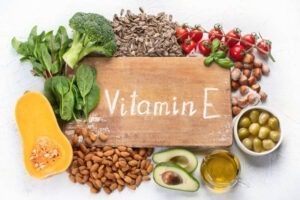
Vitamin E is a vital nutrient for skin health, renowned for its potent antioxidant properties that help protect the skin from oxidative stress and damage caused by free radicals. As a fat-soluble vitamin, it plays a crucial role in maintaining skin integrity by preventing the breakdown of collagen and elastin, essential proteins that contribute to skin elasticity and firmness.
Vitamin E also supports skin cell regeneration, aiding in the healing of wounds and minimizing the appearance of scars. Rich sources of vitamin E include nuts such as almonds and sunflower seeds, vegetable oils like sunflower and wheat germ oil, and green leafy vegetables such as spinach and broccoli.
Integrating these foods into a well-balanced diet can contribute to sufficient vitamin E intake, promoting healthier and more resilient skin. Additionally, topical application of vitamin E oil or creams containing vitamin E can offer targeted benefits for the skin.
5. Vitamin K

Vitamin K is a crucial nutrient for skin health, primarily known for its role in supporting blood clotting and bone health, but it also contributes to skin vitality. Specifically, vitamin K plays a role in preventing and reducing the appearance of bruises and dark circles by supporting blood vessel health.
This vitamin aids in the synthesis of certain proteins that help maintain skin elasticity and promote wound healing. Leafy green vegetables, such as kale, spinach, and broccoli, are excellent dietary sources of vitamin K.
Additionally, vitamin K can be obtained from other green vegetables, fish, meat, and dairy products. Including a variety of vitamin K-rich foods in your diet contributes to overall skin health and may aid in maintaining a clear and vibrant complexion.
6. Biotin (Vitamin B7):
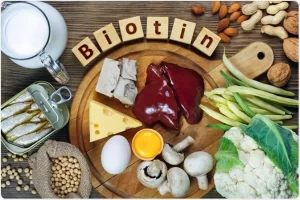
Biotin, also known as Vitamin B7, is a water-soluble B vitamin that plays a significant role in promoting skin health. It is essential for the metabolism of fats, proteins, and carbohydrates, contributing to the maintenance of healthy skin cells.
Biotin supports skin elasticity, helps prevent dryness, and promotes a more youthful appearance. While biotin deficiencies are rare, incorporating biotin-rich foods into your diet can be beneficial. Good dietary sources of biotin include eggs, nuts (particularly almonds and peanuts), seeds (such as sunflower seeds), sweet potatoes, and certain vegetables.
Additionally, biotin is often found in many multivitamin supplements and is a common ingredient in beauty supplements that target skin, hair, and nail health. However, it’s crucial to consult with a healthcare professional before adding supplements to your routine to ensure proper dosage and avoid potential interactions.
7. Vitamin B3 (Niacin):

Vitamin B3, also known as niacin, is a water-soluble vitamin that plays a crucial role in promoting skin health. Niacin contributes to maintaining a healthy skin barrier by supporting the production of ceramides, essential lipids that help retain moisture and protect the skin from external irritants.
Additionally, niacin boosts blood circulation, promoting a healthy complexion and aiding in the reduction of redness and inflammation. Dietary sources of niacin include poultry, fish, lean meats, mushrooms, and whole grains.
Moreover, some niacin is synthesized by the body from the amino acid tryptophan, found in protein-rich foods like turkey, chicken, and tofu. Ensuring sufficient niacin intake through a well-balanced diet contributes to overall skin health and can be particularly beneficial for individuals dealing with conditions such as acne or eczema.
8. Omega-3 Fatty Acids:
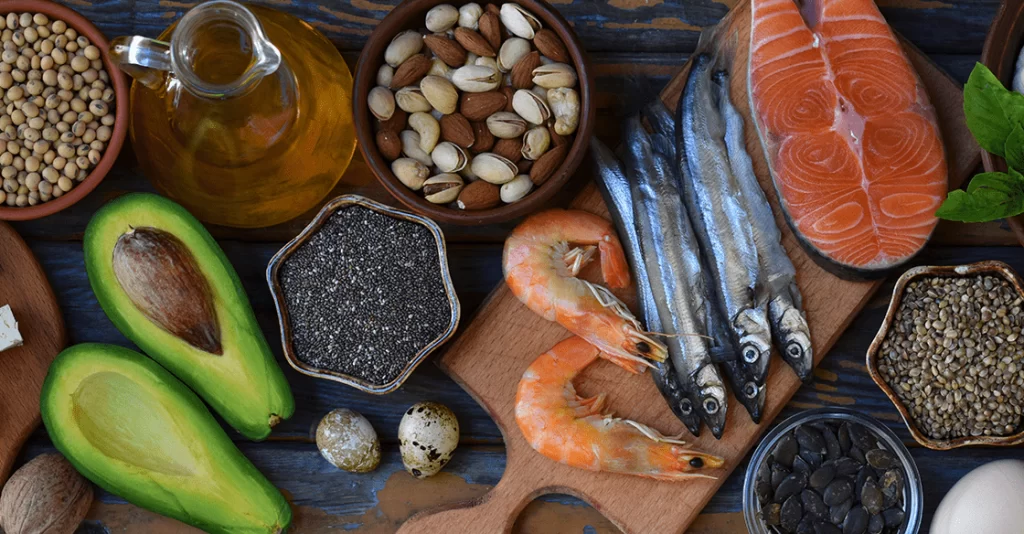
Omega-3 fatty acids are essential components for maintaining optimal skin health, contributing to its hydration, flexibility, and overall integrity. These fatty acids, particularly EPA (eicosapentaenoic acid) and DHA (docosahexaenoic acid) are crucial for the formation of the skin’s natural lipid barrier, which helps retain moisture and protect against environmental stressors.
Fatty fish such as salmon, mackerel, and sardines are excellent sources of omega-3s. Plant-based sources include flaxseeds, chia seeds, and walnuts, which provide alpha-linolenic acid (ALA), a precursor to EPA and DHA. Including omega-3-rich foods in your diet can help reduce inflammation, soothe irritated skin, and contribute to a radiant complexion.
Alternatively, omega-3 supplements like fish oil or algae oil capsules can be considered under the guidance of a healthcare professional to ensure adequate intake and balance in supporting skin health.
9. Zinc:

Zinc is one of the best nutrients for skin health. It is a vital mineral for daily skincare routine, playing a crucial role in various physiological processes that contribute to skin function and appearance. It is involved in wound healing, immune system support, and the regulation of sebum production.
As a result, zinc can help prevent and alleviate skin issues such as acne and eczema. Excellent dietary sources of zinc include seafood such as oysters, crab, and lobster, as well as poultry, lean meats, and dairy products. Plant-based sources include legumes, nuts, and seeds.
While zinc supplements are available, it’s important to consult with a healthcare professional before considering them to ensure appropriate dosage and to avoid potential interactions with other nutrients. Maintaining adequate zinc levels through a balanced diet is integral to supporting overall skin health and resilience.
10. Silica
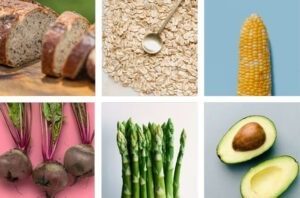
Silica, also known as silicon dioxide, is a trace mineral that contributes to skin health by promoting the formation of collagen, a key protein for skin elasticity and firmness. While research on silica’s direct impact on the skin is ongoing, it is believed to play a role in maintaining the structural integrity of connective tissues, including those in the skin.
Silica is naturally found in various foods, including whole grains such as oats and brown rice, as well as in certain fruits and vegetables like bananas and cucumbers. Additionally, drinking water with high silica content, such as some mineral waters, can be another source.
While silica supplements are available, obtaining them through a well-balanced diet is generally recommended to ensure proper absorption and avoid potential side effects. As with any supplement, it’s advisable to consult with a healthcare professional before considering silica supplements for skin health.
11. Collagen:

Collagen is a fundamental protein for skin health, providing structural support and elasticity. It is considered one of the best nutrients for skin health. As we age, collagen production naturally decreases, leading to wrinkles and sagging skin.
Consuming foods rich in collagen or those that support its production can contribute to maintaining skin elasticity. Bone broth is a notable source, containing collagen extracted from simmered bones and connective tissues. Additionally, collagen can be obtained from animal skin and tendons found in certain cuts of meat.
Collagen supplements, available in various forms like powders and capsules, are popular for those seeking to boost collagen levels. Moreover, incorporating vitamin C-rich foods, as well as those containing amino acids like proline and glycine, supports collagen synthesis. Including a mix of these dietary elements in one’s regimen can play a role in promoting skin suppleness and overall health.
12. Probiotics:

Probiotics, beneficial bacteria that support gut health, are increasingly recognized for their potential impact on skin health. The gut-skin axis suggests that a balanced and diverse gut microbiome positively influences the skin.
Probiotics help maintain a healthy gut flora, modulate the immune system, and may alleviate skin conditions such as acne and eczema. Fermented foods like yogurt, kefir, sauerkraut, and kimchi are rich in natural probiotics. Including these foods in one’s diet can enhance the microbial diversity in the gut, potentially translating to improved skin conditions.
Probiotic supplements are also available, offering concentrated doses of beneficial bacteria. However, as individual responses to probiotics can vary, consulting with a healthcare professional is advisable for personalized recommendations on incorporating probiotics into one’s routine to support both gut and skin health.
13. Copper
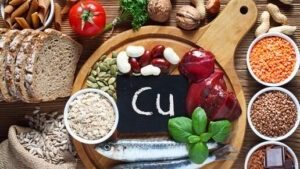
Copper is a trace mineral that plays a pivotal role in maintaining skin health by contributing to the formation of collagen and elastin, essential proteins for skin structure and elasticity. As a cofactor for numerous enzymes involved in skin regeneration and connective tissue synthesis, copper supports wound healing and helps prevent premature aging.
Foods rich in copper include nuts (such as almonds and cashews), seeds (particularly sunflower seeds), organ meats, shellfish, and whole grains. Ensuring an adequate intake of copper through a balanced diet can positively impact skin health.
While copper supplements are available, it’s essential to exercise caution, as excessive copper intake can lead to toxicity. Therefore, obtaining copper from dietary sources provides a safer and more natural approach to supporting overall skin well-being.
14. Selenium:
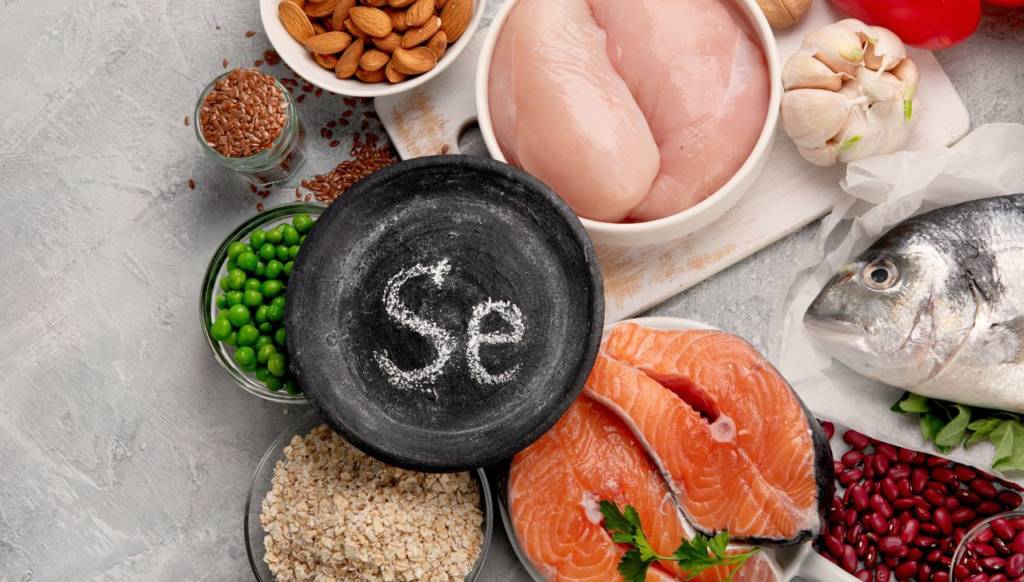
Selenium is a trace mineral that plays a critical role in promoting skin health by acting as an antioxidant and supporting the body’s defenses against oxidative stress. As an essential component of various enzymes, selenium contributes to the neutralization of free radicals, thereby protecting the skin from damage and inflammation.
It is particularly beneficial for reducing the risk of sun-induced skin damage and may aid in preventing certain skin conditions. Selenium-rich foods include Brazil nuts, sunflower seeds, fish (such as tuna and halibut), and whole grains. Incorporating these dietary sources into your meals helps ensure an adequate intake of selenium, supporting overall skin health.
While selenium is essential, it’s crucial to avoid excessive supplementation, as too much selenium can lead to adverse effects. As with any nutrient, maintaining a balanced diet is key to reaping the benefits of selenium for optimal skin well-being.
15. Magnesium

Magnesium is a crucial mineral that plays a role in supporting skin health through various mechanisms. It contributes to the body’s overall antioxidant defenses, helping to protect the skin from oxidative stress and inflammation.
Additionally, magnesium supports skin hydration and can play a part in preventing acne and other skin disorders. Dietary sources of magnesium include leafy green vegetables such as spinach and kale, nuts and seeds (particularly almonds and pumpkin seeds), whole grains, and legumes.
Incorporating these magnesium-rich foods into your diet can contribute to maintaining healthy and vibrant skin. While magnesium supplements are available, it’s important to consult with a healthcare professional to determine whether supplementation is necessary and to ensure proper dosage. A balanced diet that includes magnesium-rich foods, along with good skincare practices, can support optimal skin health.
Conclusion:
In conclusion, maintaining optimal skin health is complex and linked to a well-rounded approach that includes both internal and external care. As above mentioned, a diet rich in the best nutrients for skin health, i.e. vitamins A, C, and E, omega-3 fatty acids, zinc, and others, provides the building blocks necessary for skin regeneration, hydration, and protection against environmental stressors.
Incorporating a variety of nutrient-dense foods, including fruits, vegetables, nuts, seeds, and lean proteins, supports skin vitality from within. Additionally, staying hydrated, protecting the skin from excessive sun exposure, and adopting a consistent skincare routine contribute to an all-encompassing strategy for healthy and radiant skin.
While dietary sources are crucial, it’s important to note that individual needs may vary, and consultation with healthcare professionals or dermatologists can offer personalized guidance for addressing specific skin concerns and ensuring a holistic approach to skin health.






